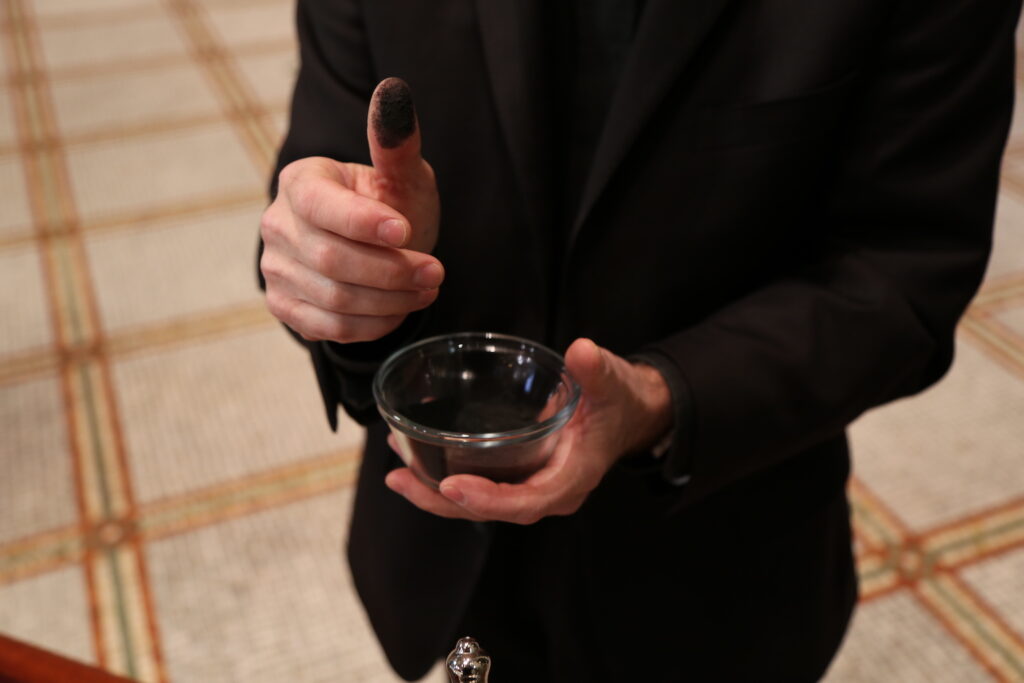Although Ash Wednesday is not a holy day of obligation, many Catholics treat it as one and attend Mass. Growing up, our family always went to Mass on Ash Wednesday.
I recall that when receiving ashes, invariably several of them would sprinkle onto my nose or into my eyes. Some priests were known for making huge smudges — the kind that covered the entire forehead. Others would use a smaller mark. I preferred the latter as it meant less on my nose and in my eyes.
That might not have been the proper spirit for receiving ashes, but when you’re a kid, that’s how you think.
As adults, we understand that our wearing ashes is a visible sign of penance. Our reception of ashes sets the tone for Lent — a season of sacrifice during which, through prayer, fasting and almsgiving, we engage in the kind of voluntary sacrifice that comes from our immersion in the Paschal Mystery.
The sacrifices we experience are not necessarily intense. Rather, they are composed of day-to-day stresses, problems, annoyances and agitations.
As a kid with eight siblings, I experienced many occasions when I was frustrated with a sibling or annoyed because I could see more quickly their habits and foibles. From time to time I would be preoccupied with and brood over the annoying behavior.
Those times were also blessings because whenever I was pained with that anger, upset or resentful because of the inconvenience that another person’s perceived faults may have caused, I would stop and remind myself that they are human beings like me, and that all of us have the ability to get under someone’s skin by what we say or do.
Instead of inconveniences, those moments of irritation can be opportunities for allowing the fruits of the Holy Spirit — love, joy, peace, patience, kindness, generosity, faithfulness, gentleness, self-control — to work in our lives.
Either of the prayers recited during the imposition of ashes — “Remember that you are dust and to dust you shall return” or “Repent and believe in the Gospel” — is a powerful message for how to live.
There is something very somber, very dramatic, in hearing that we are dust and that we will be dust again, especially if the ashes fall into your eyes. It is a vivid reminder of our limits or brokenness, and that we must be humble enough to acknowledge we are incomplete, we’re finite and everyone else is the same way.
Being told to repent and believe in the Gospel is a call to conversion. It is not easy to answer that call. It involves risk because we are abandoning ourselves to the Gospel, and in doing so we make ourselves vulnerable.
Recall what we hear in Matthew 14:29-31 when Peter gets out of the boat and walks on the water toward Jesus. The apostle does fine until he panics and starts to sink. Jesus saves him and admonishes, “O you of little faith, why did you doubt?”
When our Lord calls us to repent and return to the Gospel, he is calling us to return to those situations that may have caused us difficulties or injury and to do so in a spirit of love with a readiness to forgive and a desire to reconcile.
In taking the risk to love again, that attempt at reconciliation or charity toward another might be betrayed, ignored or rejected. But it is in the risk that there is the opportunity to establish an authentic relationship of love and mutual self-giving where both are ready to put aside grudges and injury, and begin healing that wound within us and begin rebuilding the relationship broken by sin.
Be intentional in how you observe Lent, not only with your prayer, fasting and almsgiving, but with taking to heart the words you hear when you receive ashes — whether they are “Remember that you are dust and to dust you shall return” or “Repent and believe in the Gospel.”
Make this a season in which you grow in holiness and in your relationship with God and be open to the fruits of the Holy Spirit in your day-to-day life.

